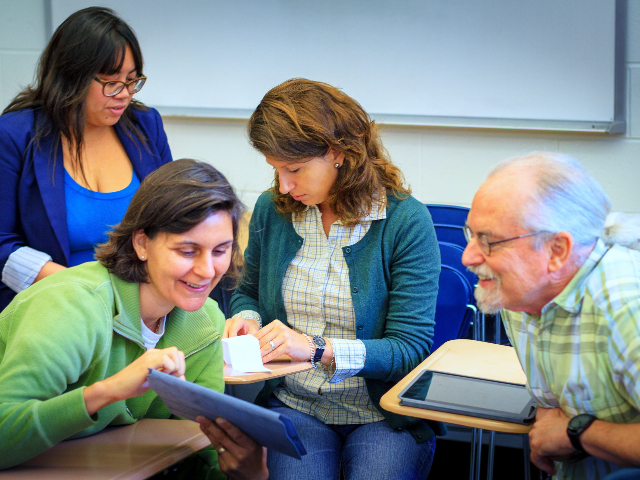You are never too old to learn something new, even if you are an adult who wants to learn a new language. There will be difficulties and challenges to overcome that younger people may not need to face, but there are also advantages to learning a language at an older age that a younger person may not have.
Ask yourself; are ever too old to go back to study at a university? Of course, the answer is no. There are many older students seeking to change career paths or simply extend their learning. If you go to a university campus, you’ll see students of all ages and walks of life going there to study. The same is for languages. You are never too old to learn a new language.
There is a myth that once you are over 25 years old you cannot learn a language. There is no age at which learning becomes impossible and you can definitely continue to learn a new language after you are 25, 30, or even 60 years old. You will find that as you age you will be continually learning new things, from how to cook a wider range of meals to DIY fix-it jobs at home. Language learning is simply one of those things that you can also add to skills.
Although you can learn something new at any age, there will be different challenges at different ages. Below I have catalogued some benefits of learning a language later on in life, while also some of the downsides that you will need to be aware of in order to be successful in learning.

Benefits Of Learning A Language As An Adult
Personal Motivation To Learn
There is something about taking a class because you’re forced to that just makes the subject less interesting. Perhaps you were in school or university and you had to take a language subject, perhaps Spanish or French. It may not have been the language you personally wanted to learn, and you weren’t interested or motivated to learn. You did put in some effort but it wasn’t much, because it wasn’t your major, and you just didn’t find it enjoyable.
Fast forward a few years later and you decide that you do want to start taking a class. It could be some sort of martial arts or music or language classes. You’re doing it because you want to, you’re passionate, motivated, and enjoy it!
If you want to learn a new language as an adult, the chances are, that you are highly motivated to do this.
Perhaps your drive and interest in language learning come from meeting someone who speaks that language and you want to speak to them in their own language, or there are some media that you want to experience in its original language. Whatever the case, a highly motivated learner will always learn faster than an uninterested person.

Perseverance And Personal Discipline
As an adult learner, you will be aware that learning anything new will take time, effort, and perseverance. This means when you struggle to understand something or there’s that word that you simply can’t stick in your mind, you know you’ll get there. It’s not a sign that you should stop trying or that you’re dumb. It’s simply that learning a new skill, any skill, is difficult and takes time, practice and perseverance.
A young person might be learning a new language because they have to for their study, and therefore won’t put much personal time or effort into it and will be disheartened by a lack of progress. Older learners will better understand that the amount of progress they make is linked to the amount of time they put in. If they do not put in the time and effort, it is inevitable that progress won’t happen.
As long as you are aware that learning a language will not be achieved overnight and that perseverance is needed, you will be able to learn a new language at any age.
During your learning journey, be aware that there may be times when your language learning seems to plateau and you may feel that you have reached a dead-end with learning. If this happens, take a look at the resources and learning methods you are using and ask yourself if there may be better ones to move on to. Think of it as getting all the possible knowledge out of a particular resource and needing to move on to another, more advanced one to move forwards. It doesn’t mean you were doing it wrong, it simply means that you are ready to progress.

Ability To Comprehend Grammar
One of the most difficult parts of learning a new language is grammar. As an adult learner, you will find it much easier to understand the technical side of languages to pick up the sentence structures, word orders, and ending of words that are needed. Simply by being exposed to your native language for longer, you will be able to connect grammatical concepts better. This may not mean you’ll still get confused between a direct and indirect object on occasion, but on the whole, younger people are more likely to become overwhelmed by the metalanguage (language used to describe language) that they need to know.
This will probably make language learning easier for you as an adult because you will be able to use the language correctly to communicate, which is what language learning is all about!
Keep in mind that grammar is not the be-all and end-all of learning a language. Having a good vocabulary base is also needed so that you can create the sentences you want. There’s not a lot of use to knowing and understanding grammar really well when your range of vocabulary allows you to say how old you are and what your favourite colour is, but nothing else!

More Freedom To Travel
One of the easiest quickest ways of learning a language is through immersion. As an adult, you have the advantage of being able to independently travel to another country to spend some time there to learn the language.
This is by far the quickest and easiest way to pick up a new language.
Depending on the country that you are travelling to, there will be opportunities to stay with a family, perhaps in exchange for some sort of work such as childminding or helping out around the house. Alternatively, try to find some work in a social environment such as a bar, or take up some study while you are in the country so that you have ways to interact with the native speakers.
Often native speakers are happy to hear you try to speak in their language, but they may also wish to practice speaking to you in your native language. If this happens, make sure you continue to speak in the target language you are learning and don’t give in to the pressure to switch to the easier option.

Negatives Of Learning A Language As An Adult
Feeling That Your Memory Is Not Up To Scratch
One of the most common things that hold new learners back is the belief that their memory is no longer good enough to learn a new language. This is totally incorrect, and should not be a reason that holds you back from learning a new language.
Consider your own native language and the words you use in this. Do you know every word in your own language? If you’re honest the answer is no; there will always be topic-specific words, such as medical or scientific words, that you simply won’t know because you don’t use them. The same will happen with your second language; words that you often use will be retained while words that you don’t use as often will probably be harder to keep at the tip of your tongue. That’s simply a comment on the topics you prefer to talk about rather than your memory.
All you need is time, patience, and self-discipline and you’ll be surprised what your mind is able to retain. Older language learners will have more life experience and a wide range of concepts they will be able to link newly learned words to, helping them remember them easier than a younger person. You may simply need to find different methods to remember the vocabulary that you are learning. There are some tips for learning vocabulary that may help you in these posts here and here.
Furthermore, there is some information in this post discussing the health benefits of knowing more than one language, which may help encourage you to start learning.

Fear Of Slow Progress And Making Too Many Mistakes
You may not remember what it was like for you to learn a new language as a child, but you have probably seen young children when they are trying to speak. It’s slow, jumbled, and full of mistakes. Fast forward a few years and the child is now a native speaker of their language – no matter what the language is! Of course, they still make mistakes, they continue through school and college, into new jobs, and are always learning new words and ways to communicate with other people.
As adults, we often believe a mistake is a setback rather than an opportunity to learn and improve.
Even worse, adults can see mistakes as proof that we are not learning when in reality you will never stop learning a language. While learning a language, you will make mistakes. You will get the grammar wrong, you may say “potato” instead of “years” in a sentence, and call your wife by a male pronoun. Don’t be discouraged by this, practice makes perfect. At the end of the day, most mistakes will be easy to get past because you are still able to communicate with other people.
If you ever feel down about the number of mistakes you are making or the speed at which you are learning, ask yourself, how long does it take a child to learn their first language to a fluent level? Remember, that child (ideally) had parents, friends, and teachers who were listening to their mistakes and correcting them throughout their whole life from birth through to young adulthood.
Furthermore, young children learn pronunciation and verb conjugations through trial and error. Parents who hear their child saying “I goed fast” will correct them and say something like “You went fast did you?” to show them the correct words that they should be using. Over time, the child will start to adopt the correct words to use through the repetitive corrections they receive.
In the same way, don’t be afraid of making mistakes, usually, people who hear you trying to speak in their native language are simply overjoyed and don’t care about the mistakes you make, they’re just happy you’re trying!

Forgetting How To Learn
Part of your journey of language learning will be learning the ways that you yourself best learn. Perhaps it’s been a long time since you’ve been studying anything and are out of the habit of spending time and energy studying. Perhaps you’ve actually forgotten the tips and tricks you used as a child to help you when you did study. This can make the job of learning a new language particularly difficult, but this is easy to solve, as you are simply out of practice with learning.
There are plenty of great resources available for any language you could want to learn, ranging from online tutors to speak to, books about grammar or stories in the target language, and apps to help you learn. It may be a matter of trial and error to find the best way that you learn but keep at it, there is sure to be an app or learning method that works for you!
If you are not sure what resources to use, I would recommend that you start with some free language-learning apps, such as Duolingo or Clozemaster, and possibly some language-learning textbooks from your local library. You can create your own vocabulary using programs such as Anki (free online and Android), or look for pre-made lists again on Anki or perhaps Memrise. Have a look at the various posts on this site if you want to know more about, for example, using language tutors, or different methods of language learning such as with or without textbooks, language learning through listening and learning at home.
At the end of the day, everyone learnings differently. So long as you are able to effectively learn your language, the learning method you use to get there won’t be wrong. Make sure you’re open to trying new ways of learning to experiment with what works best for you.

Believing You Don’t Have Enough Time To Learn
One of the biggest problems that will hold anybody back from starting a new hobby is time. I often think back wistfully to my days as a school and university student, working a part-time job but having free time at the end of most days to do what I wanted. Since then, life seems to be continually busier with less and less time to do the things I want to do. It is understandable that such a feeling would put you off committing yourself to something new like language learning.
Whether or not you are able to find time to learn the language will ultimately come down to your motivation and passion to learn. We are able to set aside time for the things that matter most to us, so if that thing is language learning, you will be able to find the time.
Some tips to help you be more efficient in your language learning won’t go astray. Don’t forget that you can utilize travel time to listen to media in your target language, even if you can’t read it at the same time. If you’ve got a spare 3-5 minutes at some point during the day, ideally at a consistent part of your routine, use this time for vocab learning.
For me, my routine is to use my commute on the bus to do vocabulary. I change apps at specific parts of the bus journey to learn the language in different ways, using Duolingo (when learning a new language), then Clozemaster and Anki for German. If I’m in the mood for a break from that routine, I’ll usually check out songs on LyricsTraining instead. On the bus ride home I’ll read a book in my target language with the accompanying audio and then spend some time doing vocab in bed. This works well for me, but may not work for you.
The best way to learn is to be consistent, and steady, and to keep going.
You may not feel that you are learning anything new as fast as you’d like but after a week or month, you’ll be able to look back and see how far you’ve come. If you never start, you’ll never get anywhere. Start now, and take it slow. You don’t need to spend hours and hours learning a language each day; small, consistent chunks of learning time are all you need to succeed.
- Should Everyone In The World Speak A Universal Language?

- The Power of Immersing Yourself In A Language For Learning

- Start Your Language Learning Journey: Duolingo And Other Methods

- Does Learning A Language Help You Learn How Others Think

- Can You Learn a Language Without Learning Its Culture?

- Unlock Fluent Expression: Sentence Builders Across Languages

- Hidden Gems: Underrated Duolingo Languages Worth Learning

- The Ultimate German Pronunciation Guide

- Where To After Finishing Duolingo For Language Learning










